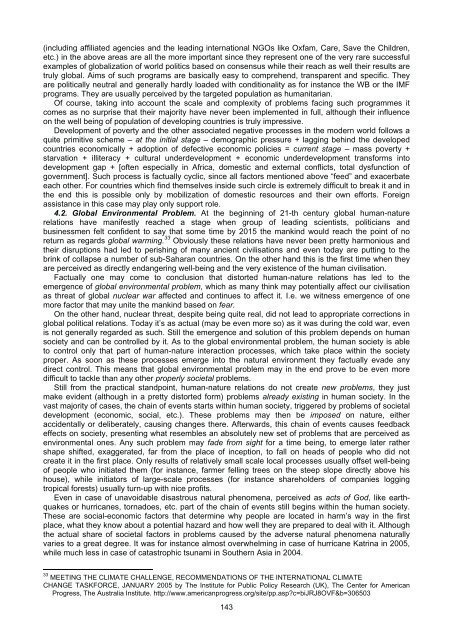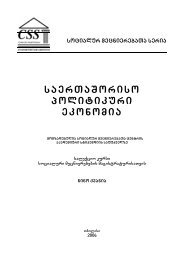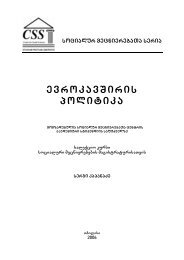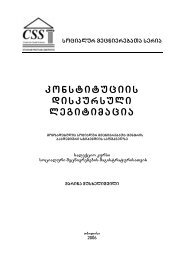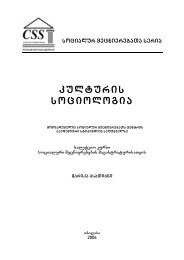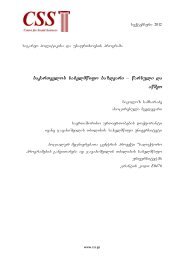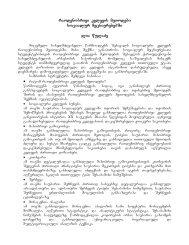developing world. Although neither this nor improved quality of life (which was usually modest, if tookplace of all) played significant role in this process. Its actual causes might be found in emancipation ofwomen, even if the actual process is relatively modest compared to the similar one that took place inthe last century in the more developed world. It looks like that in the vast majority of developingcountries just a few years of <strong>for</strong>mal schooling are enough to alter significantly demographic behaviourof women. This trend is <strong>for</strong> instance quite visible in Iran, which by no means can be considered amongthe countries that favour female rights. Fertility here dropped almost 3 times during last 30 years and isless than in the majority of Latin American countries.As a result of unsustainable levels of population growth plenty of countries have found themselvesinside so called poverty trap. Even when such countries are governed by relatively efficient and lesscorrupt governments, they are not able to cope with the problems they face, being simply too poor.Even when the governments here are truly committed to positive development they lack funds(especially collected through taxation) to invest into social sector, infrastructure, environmentalprotection, into public administration itself. Besides virtually all these countries spend huge sums toservice <strong>for</strong>eign debts. Still in the absence of basic infrastructure, social capital and efficient governanceit’s impossible to attract private investments and pursue economic development; while without roads,fertilizers, electric energy, cheap, efficient fuel, schools, hospitals, af<strong>for</strong>dable housing, and water supplypeople remain chronically hungry and sick. Besides in the majority of developing countries this situationis further exacerbated by inefficient governance, corruptions, mistaken economic policies.Furthermore – it’s virtually impossible to maintain human rights in such countries. Probability ofclashes among rival political or ethnic groups inside the single country, as well as among somecountries of such type in order to control mineral resources that may bring quick profit are extremelyhigh. Governments of such countries either can not restrict such criminal activities, or are directlyinvolved with them. Besides there is a direct causal relationship between poverty and sharp “shock”drop of population incomes on one hand and armed conflicts on the other. Poverty initiates andsustains them. Average 5% shock income drop increases probability of conflicts by 50%. 32From the <strong>for</strong>mal standpoint current state of population of the developing world has significantlyimproved as compared with 1990-s. For instance during 1990-2002 average incomes here increased by22%, number of people living in extreme poverty reduced by 139 million, average life expectancyincreased by 2 years, etc. On the other hand this process mostly affected very restricted geographicalarea of Eastern Asia, where all the progress was in turn achieved on the expense of the single country– China.From the <strong>for</strong>mal standpoint current state of population of the developing world has significantlyimproved as compared with 1990-s. For instance during 1990-2002 average incomes here increased by22%, number of people living in extreme poverty reduced by 139 million, average life expectancyincreased by 2 years, etc. On the other hand this process mostly affected very restricted geographicalarea of Eastern Asia, where all the progress was in turn achieved on the expense of the single country– China.Correspondingly number of extremely poor people in the rest of the world grew by 71 million.Epicenter of this crisis is situated in sub-Saharan Africa where there is the highest concentration ofextremely poor, starving people and AIDS patients in the world. Approximately the same situation isobserved in Southern Asia, especially in Indian countryside and urban slams. Today the number ofpeople who survives at $1.08 per day factually coincides with population of the most developedcountries of the world. Besides such situation disproportionably punishes women, children, elderly anddisabled; population of countryside and urban slams in general. These people have high chances offinding themselves inside the poverty trap.Attempts to solve demographic problems worldwide take place <strong>for</strong> almost half a century. Part ofthese ef<strong>for</strong>ts is directed at poverty eradication and population growth control within the framework ofnumerous specialized programs. These programs are mainly executed by the UN and the WB. The UNis actively involved in process since 1960 when such programs started to be implemented within theframework of so called “development decades”. During this period the UN paid special attention to suchgoals as eradication of illiteracy, development of school system, health care (including family planning),infrastructural development (water supply, sewerage), etc.Interestingly that all such UN programs truly come within the confines of the single global policy.They result from understanding among all developed as well as developing countries. UN activities32 Millenium Project. Report to the UN Secretary-General. Investing in Development. A Practical Plan to Achieve theMillenium Development Goals. Overview. 2005., p.8.142
(including affiliated agencies and the leading international NGOs like Oxfam, Care, Save the Children,etc.) in the above areas are all the more important since they represent one of the very rare successfulexamples of globalization of world politics based on consensus while their reach as well their results aretruly global. Aims of such programs are basically easy to comprehend, transparent and specific. Theyare politically neutral and generally hardly loaded with conditionality as <strong>for</strong> instance the WB or the IMFprograms. They are usually perceived by the targeted population as humanitarian.Of course, taking into account the scale and complexity of problems facing such programmes itcomes as no surprise that their majority have never been implemented in full, although their influenceon the well being of population of developing countries is truly impressive.Development of poverty and the other associated negative processes in the modern world follows aquite primitive scheme – at the initial stage – demographic pressure + lagging behind the developedcountries economically + adoption of defective economic policies = current stage – mass poverty +starvation + illiteracy + cultural underdevelopment + economic underdevelopment trans<strong>for</strong>ms intodevelopment gap + [often especially in Africa, domestic and external conflicts, total dysfunction ofgovernment]. Such process is factually cyclic, since all factors mentioned above “feed” and exacerbateeach other. For countries which find themselves inside such circle is extremely difficult to break it and inthe end this is possible only by mobilization of domestic resources and their own ef<strong>for</strong>ts. Foreignassistance in this case may play only support role.4.2. Global Environmental Problem. At the beginning of 21-th century global human-naturerelations have manifestly reached a stage when group of leading scientists, politicians andbusinessmen felt confident to say that some time by 2015 the mankind would reach the point of noreturn as regards global warming. 33 Obviously these relations have never been pretty harmonious andtheir disruptions had led to perishing of many ancient civilisations and even today are putting to thebrink of collapse a number of sub-Saharan countries. On the other hand this is the first time when theyare perceived as directly endangering well-being and the very existence of the human civilisation.Factually one may come to conclusion that distorted human-nature relations has led to theemergence of global environmental problem, which as many think may potentially affect our civilisationas threat of global nuclear war affected and continues to affect it. I.e. we witness emergence of onemore factor that may unite the mankind based on fear.On the other hand, nuclear threat, despite being quite real, did not lead to appropriate corrections inglobal political relations. Today it’s as actual (may be even more so) as it was during the cold war, evenis not generally regarded as such. Still the emergence and solution of this problem depends on humansociety and can be controlled by it. As to the global environmental problem, the human society is ableto control only that part of human-nature interaction processes, which take place within the societyproper. As soon as these processes emerge into the natural environment they factually evade anydirect control. This means that global environmental problem may in the end prove to be even moredifficult to tackle than any other properly societal problems.Still from the practical standpoint, human-nature relations do not create new problems, they justmake evident (although in a pretty distorted <strong>for</strong>m) problems already existing in human society. In thevast majority of cases, the chain of events starts within human society, triggered by problems of societaldevelopment (economic, social, etc.). These problems may then be imposed on nature, eitheraccidentally or deliberately, causing changes there. Afterwards, this chain of events causes feedbackeffects on society, presenting what resembles an absolutely new set of problems that are perceived asenvironmental ones. Any such problem may fade from sight <strong>for</strong> a time being, to emerge later rathershape shifted, exaggerated, far from the place of inception, to fall on heads of people who did notcreate it in the first place. Only results of relatively small scale local processes usually offset well-beingof people who initiated them (<strong>for</strong> instance, farmer felling trees on the steep slope directly above hishouse), while initiators of large-scale processes (<strong>for</strong> instance shareholders of companies loggingtropical <strong>for</strong>ests) usually turn-up with nice profits.Even in case of unavoidable disastrous natural phenomena, perceived as acts of God, like earthquakesor hurricanes, tornadoes, etc. part of the chain of events still begins within the human society.These are social-economic factors that determine why people are located in harm’s way in the firstplace, what they know about a potential hazard and how well they are prepared to deal with it. Althoughthe actual share of societal factors in problems caused by the adverse natural phenomena naturallyvaries to a great degree. It was <strong>for</strong> instance almost overwhelming in case of hurricane Katrina in 2005,while much less in case of catastrophic tsunami in Southern Asia in 2004.33 MEETING THE CLIMATE CHALLENGE, RECOMMENDATIONS OF THE INTERNATIONAL CLIMATECHANGE TASKFORCE, JANUARY 2005 by The Institute <strong>for</strong> Public Policy Research (UK), The <strong>Center</strong> <strong>for</strong> AmericanProgress, The Australia Institute. http://www.americanprogress.org/site/pp.asp?c=biJRJ8OVF&b=306503143
- Page 1 and 2:
socialur mecnierebaTa seriamsofliop
- Page 3:
s a r C e v iSesavali .............
- Page 6 and 7:
situaciis arseboba, Tavis mxriv, am
- Page 8 and 9:
globalizacia — ori antagonisturi
- Page 10:
(informacia), vidre ramdenime aTeul
- Page 13 and 14:
TanamSromlobas. faqtiurad SesaZlebe
- Page 15 and 16:
1.3. msoflio politikis Teoriebi1.3.
- Page 17 and 18:
TanamSromlobaze uaris Tqma sul ufro
- Page 19 and 20:
danarCeni msofliosagan gansxvavebiT
- Page 21 and 22:
meqanizmebi ubralod ar arsebobs;•
- Page 23 and 24:
idga zemoT daxasiaTebul “piramidu
- Page 25 and 26:
amocanebis gadasaWrelad. 37es ar ni
- Page 27 and 28:
dacema, pirvel rigSi, materialuri d
- Page 29 and 30:
ealurad globaluri iyo. isini, isevd
- Page 31 and 32:
mSeneblobis procesSi klasobrivi brZ
- Page 33 and 34:
dolaris daxmareba miiRo.sainteresoa
- Page 35 and 36:
sistemas da gamoiwvia britaneTis im
- Page 37 and 38:
miekuTvneboda (ix. danarTi 3.1 da 3
- Page 39 and 40:
TiTqmis mTlianad ugulvebelyos is pr
- Page 41 and 42:
2.2.5. meore globalizaciis dros gag
- Page 43 and 44:
gakeTeba (iaponia). meore mxriv, er
- Page 45 and 46:
ac saboloo jamSi qmnis sistemis des
- Page 47 and 48:
laparakia imaze, rom romelime calke
- Page 49 and 50:
mmarTvelobis principebis adaptacia
- Page 51 and 52:
matareblebi arian. ukve es faqti aq
- Page 53 and 54:
warmoadgens nebismieri warmatebuli
- Page 55 and 56:
koloradosa da vaiomingis nawilebi.
- Page 57 and 58:
xSirad faqtiurad kulturuli misioner
- Page 59 and 60:
dasawyisSi oficialurad TviT aSS-ma
- Page 61 and 62:
mosaxleobis 20%, romelic yvelaze md
- Page 63 and 64:
sruli liberalizaciis Sesaxeb faqtiu
- Page 65 and 66:
gansxvavebebi, ganpirobebuli maTi e
- Page 67 and 68:
urTierTobaSi.3.4. zemoT aRwerili pr
- Page 69 and 70:
evri qveynisaTvis zemoT aRwerili ti
- Page 71 and 72:
aSS saerTaSoriso daxmarebis naxevar
- Page 73 and 74:
aSkarad sWarbobs evrogerTianebis ne
- Page 79 and 80:
meore — Tanamedrove sabrZolo saSu
- Page 81 and 82:
SeuZliaT, an ar awyobT efeqturi Ron
- Page 83 and 84:
amoiwura.cnobili ebraeli moRvawe,
- Page 85 and 86:
masze agebuli civilizaciis sistemur
- Page 87 and 88:
eJimi mravali wlis manZilze xels uw
- Page 89 and 90:
mxolod SedarebiT mcire nawils Seexo
- Page 91 and 92: daavadebebiT. am konfliqtSi monawil
- Page 93 and 94: naxevar saukunes moiTvlis. principS
- Page 95 and 96: kontrols eqvemdebareba.rac Seexeba
- Page 97 and 98: • faqtiurad nebismieri gadawyveti
- Page 99 and 100: 4.2.3. globalur doneze aseTi tipis
- Page 101 and 102: krizisebisagan, rom rodesac bazari
- Page 103 and 104: sabWoTa kavSirma gamomdinare nawilo
- Page 105 and 106: usafrTxoebis erT-erTi ZiriTadi elem
- Page 107 and 108: Microsoft-is top-menejerebs). sadac
- Page 109 and 110: veb-gverdebs; xolo Google-m 2006 we
- Page 111 and 112: saxiT, amerikis moqmedeba SedarebiT
- Page 113 and 114: organizaciebis da a.S.amave dros, r
- Page 115 and 116: 2 termini globaluri mainc uamravi s
- Page 117 and 118: 61 ssrk-s SemTxvevaSi etyoba misi g
- Page 119 and 120: 30-jer naklebia, vidre saavtomobilo
- Page 121 and 122: SesaZlebelia faqtiurad nebismieri s
- Page 123 and 124: however powerful, can become transn
- Page 125 and 126: 2. Does not matter in what sphere o
- Page 127 and 128: system, which leads to restoration
- Page 129 and 130: On the other hand, in the late 19 t
- Page 131 and 132: traceable here, technological compo
- Page 133 and 134: extremist than terrorists themselve
- Page 135 and 136: human rights is routine. 24The situ
- Page 137 and 138: Transformation of Islam, as the rel
- Page 139 and 140: countries, where the government and
- Page 141: Of course if the developed world ma
- Page 145 and 146: including legal acts, represents re
- Page 147 and 148: passed by its more successful prede
- Page 149 and 150: principle should possess some cultu
- Page 151 and 152: coherent and purposeful than before


